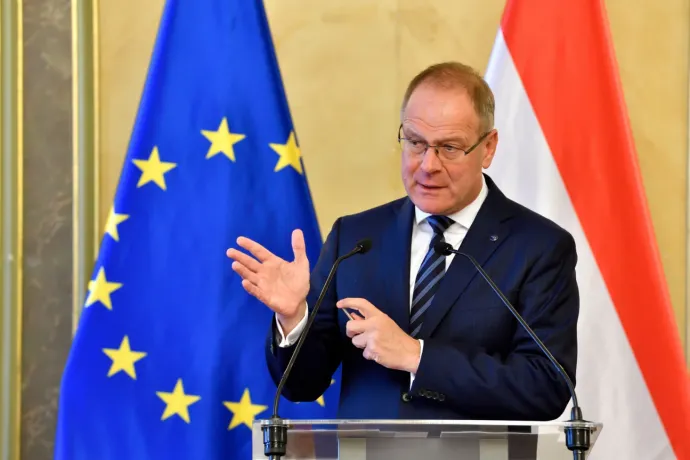Some EU funds for Hungary to come soon, but not right away and not all of them

The European Commission proposed the approval of the revised Hungarian recovery plan on Thursday. This is the first official green light the Hungarian government has received about any of the blocked EU funds in a long time, effectively since last December, and a shortcut to an advance of nearly €1 billion has also been opened.
The plan details the spending the resources of the one-off recovery fund, which is available in addition to the EU budget. The Hungarian government initiated the plan's revision at the end of August.
Of the €4.6 billion adjustment, €3.9 billion is a loan, with €700 million of non-refundable grant available from REPowerEU, bringing the total amount of funding Hungary will receive from the recovery fund to €10.4 billion.
Most member states submitted their amendments around the August deadline, and the European Commission has already given its approval to several countries' plans since Tuesday.
The decision does not mean that the government will immediately see cash coming in from the fund (from which it has not received a single euro cent so far).
It remains largely cut off from it by 27 'super milestones', which cover almost an entire set of conditions comprised of roughly thirty components, including judicial reform, affecting multiple resources. The current decision does not mean that the European Commission considers the conditions to be fulfilled.
It is officially up to member states to decide whether to approve the revision based on the Commission's proposal, although this is expected to be a formality. The finance ministers’ next meeting is scheduled for 8 December.
There may be a shortcut to the advance payment
It is significant, however, that the Commission's proposal also provides a shortcut which makes it possible for Hungary to receive about 460 million euros (about HUF 175 billion) within just a few months.
The revision comes with an advance payment of up to 20 percent, which under the rules is not blocked by the super-milestones, despite some initial uncertainty on this. In September, Hungary's EU Affairs Minister János Bóka said that they had not discussed the advance payment with the European Commission and talking about it would only be worthwhile once the revision of the recovery plan was adopted.
The advance could be paid in two installments. The first half, the €460 million mentioned above, might arrive in February (two months after the financial and loan agreements have been signed, which should happen by the end of the year following approval from member states), and the second half next December.
The ones definitely not coming for a while
Regarding the Recovery and Resilience Facility, speaking last week, Minister of Regional Development Tibor Navracsics, said that “it is already clear that the deadlines for the RRF cannot be met.”
Most of the – roughly €22 billion – cohesion funding from the regular budget is also blocked by various conditions. The biggest of them is a judicial reform, which is blocking almost all of these funds.
According to Radio Free Europe, "some legislative amendments will likely be needed to address the remaining concerns of the Commission, which is something that should be decided at the highest level in Budapest" to fulfil the requirements for the judicial reform.
It's also worth keeping an eye on the conditionality rule-of-law procedure, worth around €6.3 billion, because the European Commission has to put forth a mid-term review on 15 December, detailing how Hungary is progressing with the 17 conditions that need to be fulfilled in exchange for the funds. It is these and the judicial package, among others, that make up the 27 super-milestones of the recovery fund. So if nothing else, the report will reveal where the Hungarian government stands on the relevant criteria.
The agreement on Erasmus was originally planned for the end of March. Although that was more than six months ago, negotiations have still not been concluded and the proposal intended to remedy the problems of transparency and conflict of interest regarding trust funds overseeing 21 Hungarian universities still has not been adopted. The lack of transparency and conflict of interest observed with universities which have undergone a model change are the reasons why EU Member States, on a Commission proposal, have cut these institutions off from new EU commitments.
The situation is even more problematic for Horizon Europe research partnerships, which have been less talked about than Erasmus, but which are much better funded. As early as June, affected universities complained of being excluded from research programs and losses of millions of euros, and the situation still remains unresolved.
For more quick, accurate and impartial news from and about Hungary, subscribe to the Telex English newsletter!